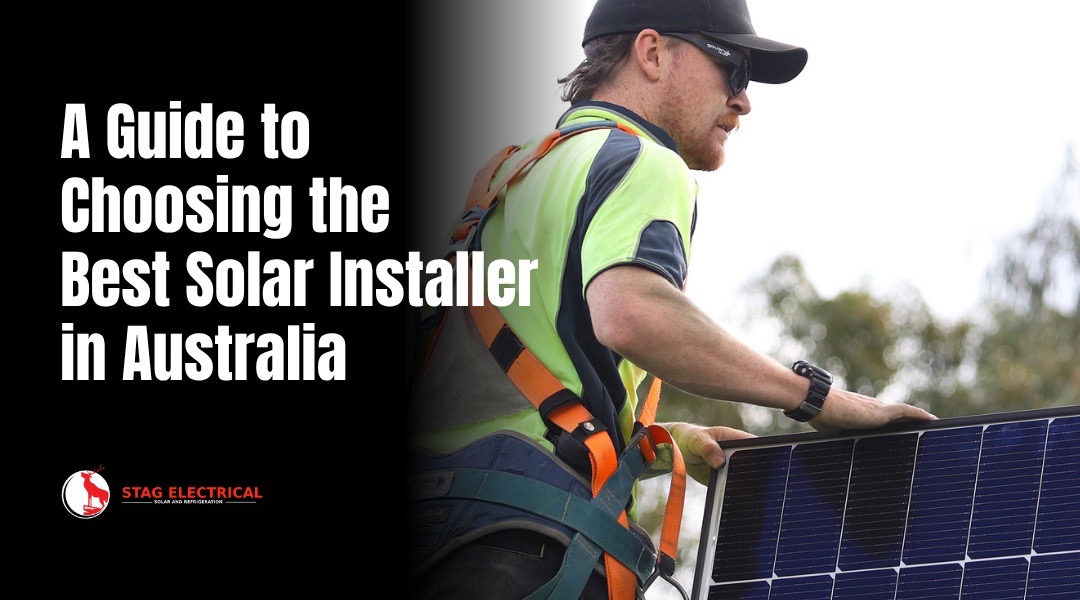Investing in solar energy is a smart way to reduce energy bills, increase property value, and make your home more sustainable. However, the performance and longevity of your solar system depends heavily on choosing the right solar installer for your home.
A poor choice can lead to inefficient systems, warranty issues, safety concerns, and financial loss. Homeowners need to consider accreditation, experience, products, warranties, and pricing before selecting a solar installer. This guide provides clear, practical advice to help homeowners make informed decisions.
Why Choosing the Right Installer Matters
Solar installation is a technical process that requires skill and knowledge. Selecting an unqualified or inexperienced installer can result in:
- Reduced system efficiency and lower energy production
- Safety hazards due to incorrect wiring or installation
- Voided warranties on panels, inverters, or batteries
- Non-compliance with Australian standards, affecting insurance or incentives
Choosing a qualified installer ensures your system operates safely, meets all legal requirements, and delivers the expected energy savings over time. The right installer also helps you maximise government incentives and rebates for solar installation.
Accreditation and Certification
Accreditation is one of the first things homeowners should verify when choosing an installer. In Australia, reputable installers are SAA Accredited, a standard maintained by the Solar Accreditation Australia. SAA guarantees that installers:
- Comply with national electrical and safety standards
- Are trained to design and install solar systems efficiently
- Can provide certified installation for government rebates and incentives
Hiring a SAA Acrredited solar installer helps protect your investment, ensures system reliability, and maintains warranty eligibility. Always confirm the installer’s accreditation status before committing.
Experience and Track Record
Experience is a critical factor in solar installation. Installers with years of residential projects are more likely to:
- Accurately assess roof conditions and energy requirements
- Recommend appropriate system sizes and configurations
- Handle complex or challenging installations effectively
- Provide practical advice for maintenance and monitoring
Homeowners should request examples of past work, portfolios, or case studies. This allows you to see the installer’s capabilities and gives confidence that your system will be installed correctly.
Customer Reviews and References
Checking customer feedback is essential for evaluating reliability and service quality. Consider:
- Online reviews on Google, social media, or independent platforms
- Testimonials on the installer’s website
- Direct references from previous clients
Verified reviews and strong customer references indicate that the installer consistently delivers quality results. They also help homeowners understand how the installer handles issues and post-installation support.
Stag Electrical has been recognised for its excellence in solar installation as the 2025 Best Solar Installer in ACT and a proud finalist for the Best Solar Installer in Australia. This recognition reflects a commitment to quality, reliability, and professional service for homeowners across Australia.
Warranty and After-Sales Support
Reliable installers provide clear warranties for both products and installation. Key areas to evaluate include:
- Panels: Typically 20–25 year performance warranties
- Inverters: Typically 10–12 year warranties
- Installation workmanship: Coverage against defects
Warranties give homeowners confidence that the system will perform as expected. After-sales support, including monitoring, troubleshooting, and maintenance, is equally important to ensure long-term system efficiency.
Pricing and Cost Transparency
While cost is important, homeowners should prioritise value over price alone. A clear, itemized quote should include:
- System capacity (kW)
- Equipment brands and models
- Installation fees
- Warranty coverage and ongoing support
Transparent pricing prevents unexpected costs and allows homeowners to compare multiple installers effectively. Avoid quotes that are unusually low or vague, as these may indicate lower-quality products or installation standards.
Some of the Most Trusted Solar Products in Australia
Selecting the right products is just as important as choosing the installer. High-quality solar panels and batteries ensure optimal system performance, longevity, and safety. When evaluating installers, it’s important to ask about the products they use.
Solar Panels
- Jinko panels: Trusted worldwide for reliability, high efficiency, and strong warranties.
- Aiko panels: Known for durability, high efficiency, and consistent performance across varying weather conditions.
- Other reliable panel brands: LONGi, Canadian Solar, and REC panels are also widely used and trusted in Australia for performance and warranty reliability.
Solar Batteries
High-quality batteries improve energy independence, store excess energy for use at night, and provide backup power during outages. Using reliable batteries ensures longer life, safe operation, and maximised energy savings.
Some of the batteries recommended include:
Other high-quality battery brands available in Australia include Goodwe,Tesla Powerwall, and BYD, which are also reliable options for homeowners looking for safe, long-lasting solar storage.
Using trusted products maximises system efficiency, reduces maintenance issues, and ensures long-term energy savings. Installers who offer these products demonstrate a commitment to quality and reliability.
Technology and Equipment Considerations
In addition to selecting high-quality products, homeowners should evaluate:
- Inverter type and quality: Inverters manage energy conversion and affect system efficiency.
- Battery compatibility: Ensure your solar system and battery are fully integrated for maximum savings.
- Monitoring systems: Real-time monitoring can help detect performance issues early.
Choosing systems that use premium equipment provides confidence that your home solar system will deliver consistent energy production for years.
Customer Education and Consultation
An effective installer educates homeowners about:
- System sizing and expected energy savings
- Roof placement, orientation, and shading considerations
- Maintenance requirements and monitoring tools
Understanding how a solar system works helps homeowners make informed choices and maximise long-term efficiency. A detailed consultation allows homeowners to compare different system designs and equipment options.
Red Flags to Watch Out For
Be cautious of installers who:
- Are not SAA-accredited
- Cannot provide references or a portfolio of previous work
- Offer unclear warranties or no post-installation support
- Use low-quality panels or inverters
- Employ high-pressure sales tactics
Avoiding these red flags can help prevent costly mistakes and ensure a safe, reliable solar installation.
Making the Final Decision
When choosing an installer, consider:
- Accreditation and certifications
- Experience with residential solar installations
- Reviews and references
- Warranty and after-sales support
- Transparent pricing
- Trusted equipment, including panels and batteries
Evaluating installers across these factors ensures homeowners receive a safe, efficient, and high-performing solar system.
Selecting the right solar installer is crucial for maximising energy savings, maintaining system reliability, and protecting your investment. Careful research and comparison help homeowners make informed decisions and avoid common pitfalls.
Take the Next Step with Stag Electrical
For homeowners ready to explore solar installation, Stag Electrical provides guidance, premium equipment, professional installation and a 25-year workmanship warranty. Contact us today for a free energy assessment and personalised solar quote to start saving energy and future-proof your home.




